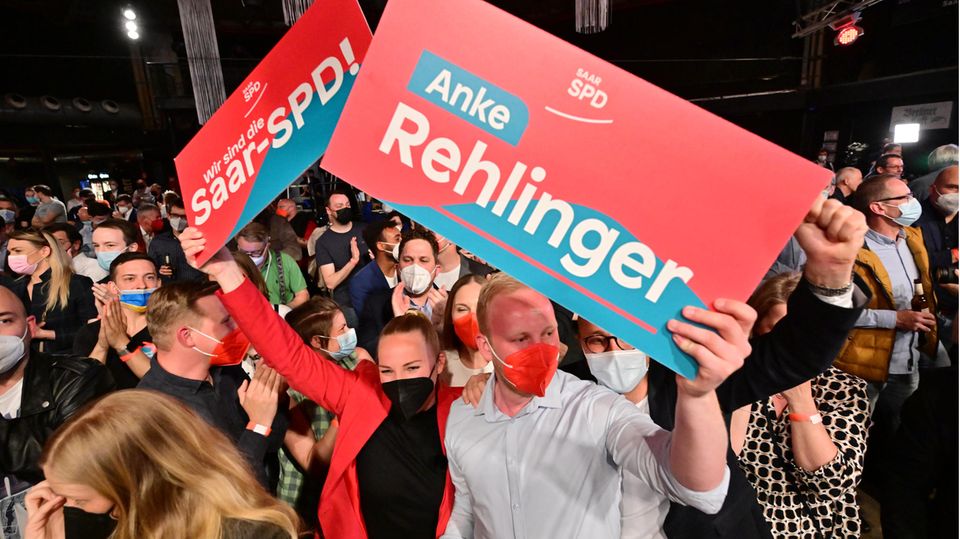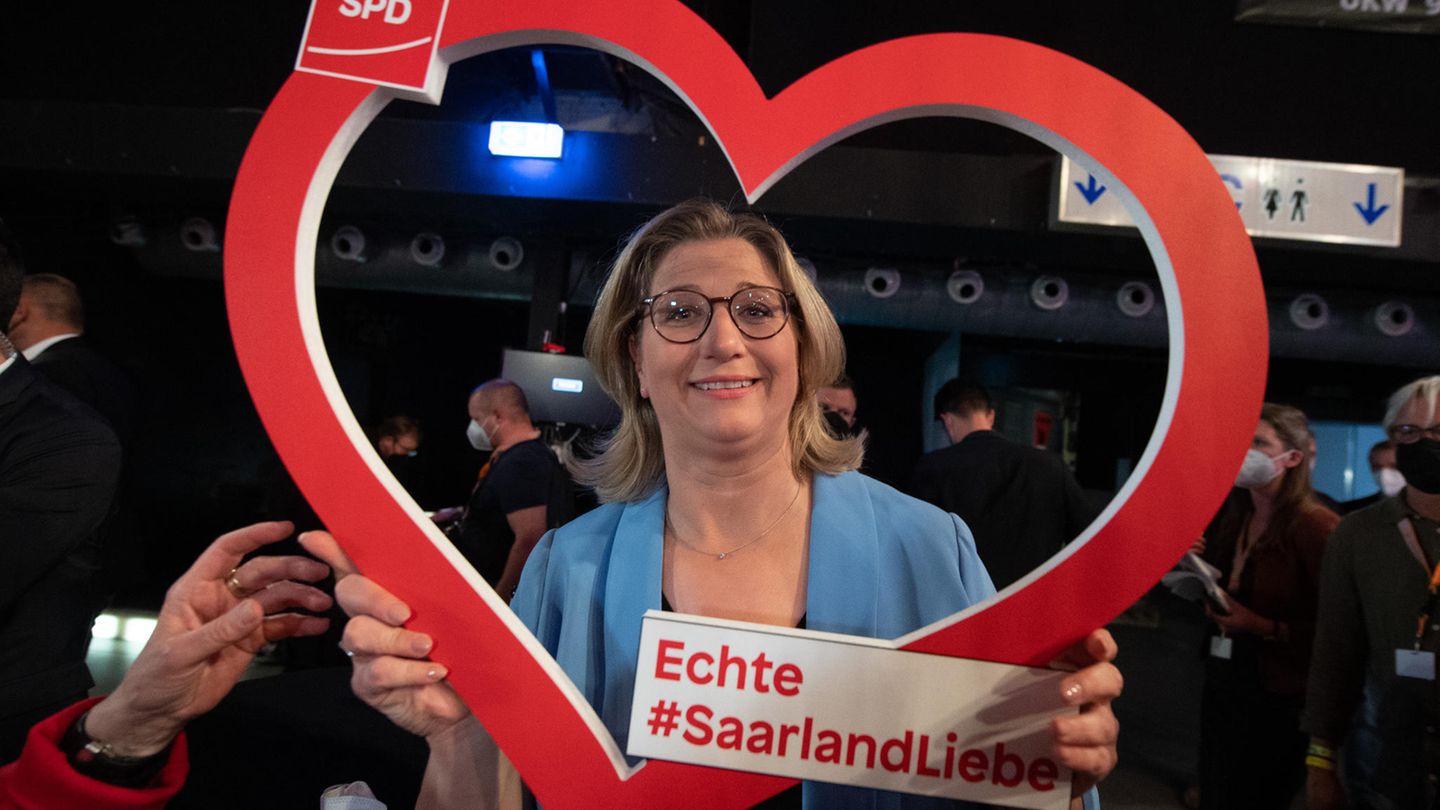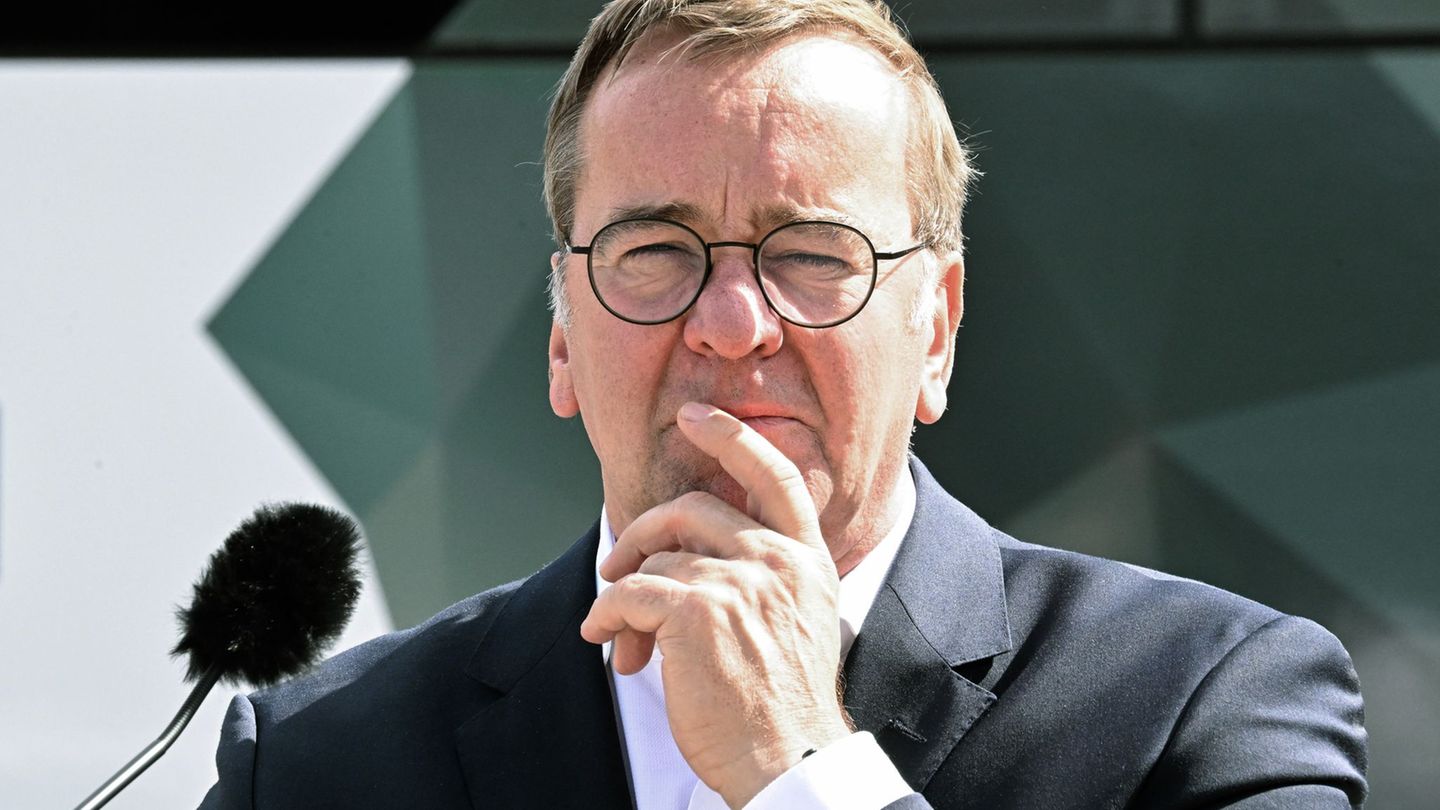In the future, Anke Rehlinger can govern with an absolute majority in Saarland. The SPD claimed a landslide victory on Sunday while the CDU experienced a historic debacle. The Greens lacked only a few votes to enter the state parliament.
After 23 years there is a change in power in Saarland. With a triumphant result, the SPD replaced the CDU as the strongest party in the state elections on Sunday. The new prime minister will be the previous economics minister, Anke Rehlinger (45). Due to the narrow failure of the Greens and the FDP at the five percent hurdle, they can govern alone with an absolute majority of the seats in the future. The deselected CDU Prime Minister Tobias Hans (44) indicated his resignation from the head of the state CDU after a historic election debacle in the Saar.
The first state election since the federal election six months ago was also a mood test for the new federal government – with weak results for the smaller coalition partners of the Social Democrats in Berlin. Both the Greens and the FDP failed again in their attempt to gain seats in the Saarbrücken state parliament – according to the election management, the Greens fell by just 23 votes.
Saar-CDU achieves worst result in 67 years
According to the preliminary result, the SPD comes to 43.5 percent. It increased by 13.9 percentage points compared to 2017 (29.6 percent). According to the figures, the CDU falls to around 28.5 percent (2017: 40.7 percent) – its worst result in Germany’s smallest non-city state for 67 years. According to the projections, the SPD even has a narrow absolute majority in Germany’s smallest state parliament. It was 26 or 27 out of a total of 51 mandates.
All the arithmetic games of the evening were settled at the very end, when the final result was the end of the Greens and the FDP. During the evening, Rehlinger left open whether she would dare to rule alone, if the numbers bear this out. She said on ZDF: “For me, stability is the decisive factor in forming a government.” But now she can have it on her own. With 29 out of 51 seats, she has a stable majority in the new state parliament, in which only three parties sit.

Greens fail gossamer, the left cracking
Because of the smaller parties, only the AfD made it over the five percent hurdle. With 5.7 percent (2017: 6.2), despite slight losses, she made it safely into the state parliament, where she is represented with three seats. While the FDP was below the threshold for practically the whole evening, the Greens only failed at the very last moment. From around six percent in the first projections, they ultimately slipped just 4.99502 percent in the preliminary final result from the target by a hair’s breadth. That is so close that it remains exciting for the Greens until the official end result is determined. It is well known that hope dies last.
The Left Party, which was thrown out of the state parliament with only 2.5 (12.8), is definitely no longer there. The party had had serious quarrels in the Saar – up to the resignation of its ex-federal chairman Oskar Lafontaine. Voter turnout was around 63 percent, lower than five years ago. At that time it was 69.7.
SPD With Anke Rehlinger four heads of government
The SPD federal vice-president Rehlinger made the leap to the top in her home country at the second attempt. The lawyer is now the first SPD head of government in the history of Saarland. Nationwide, there will then be four social democratic women at the head of a state government – more than ever before. The other parties from the Union to the Greens to the Left only have male heads of government. For the Saar SPD, this is the best result since the turn of the millennium.
The comrades, of course, cheered their success. “The Saarland voted red,” said Rehlinger. The SPD federal chairman Lars Klingbeil said: “The comeback of the SPD, which we experienced in the federal election, was not unique to the federal election, but we continue to win elections afterwards.” Chancellor Olaf Scholz (SPD) wrote on Twitter: “The Saarlanders have made a clear decision to change the leadership of their country.”
The SPD is now hoping for a tailwind for the next elections this year: in May there will be elections in Schleswig-Holstein and North Rhine-Westphalia, and later also in Lower Saxony.
<x-embed class=”js-embed embed u-typo u-typo–article-text” consent=”pending” privacy-link=”https://www.stern.de/datenschutzbestimmungen-4541848.html” privacy-settings-link=”https://www.stern.de/politik/deutschland/javascript:window._sp_.loadPrivacyManagerModal(237312)” srcdoc=’
‘ vendor-id=”5fbbda5b6eae2727f61d3fbd” vendor-name=”dpa infocom”>
Tobias Hans without the support of the federal CDU
Prime Minister Hans meanwhile announced “personal consequences”. “This is really a very bitter defeat for the Christian Democrats in the Saar.” The CDU had not succeeded in putting the important issues in the foreground. The CDU had been the head of government in Saarbrücken for almost 23 years without interruption. However, Hans was his party’s top candidate for the first time. Hans announced a decision on his resignation from the CDU state presidency for Monday. “It was an honor to have served this country as prime minister and an honor to have served you as party leaders,” he told party members.
CDU General Secretary Mario Czaja described his party’s crash as a “bitter evening” and a “painful result.” The new federal chairman Friedrich Merz initially did not comment. Even before the election, he had been accused of lacking support in the election campaign. When asked about this on the evening of the election, Hans did not want to go into it, but did not reject the accusation either.
Source: Stern
David William is a talented author who has made a name for himself in the world of writing. He is a professional author who writes on a wide range of topics, from general interest to opinion news. David is currently working as a writer at 24 hours worlds where he brings his unique perspective and in-depth research to his articles, making them both informative and engaging.




